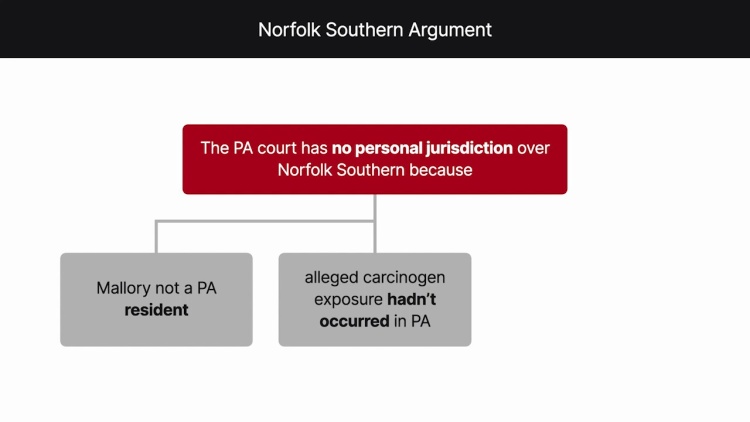Mallory v. Norfolk Southern Railway Co.
United States Supreme Court
600 U.S. 122 (2023)
- Written by Abby Roughton, JD
Facts
Robert Mallory (plaintiff) worked as a mechanic for Norfolk Southern Railway Company (Norfolk) in Ohio and Virginia for almost 20 years. Mallory subsequently moved to Pennsylvania and back to Virginia. During that time, Mallory was diagnosed with cancer, which Mallory believed was caused by carcinogen exposure during his employment with Norfolk. Mallory sued Norfolk in Pennsylvania state court to recover damages. Mallory lived in Virginia when the lawsuit was filed. Norfolk moved to dismiss, asserting that the Pennsylvania court lacked personal jurisdiction over Norfolk because (1) Mallory lived in Virginia, (2) Mallory’s alleged carcinogen exposure had occurred in Ohio and Virginia, and (3) Norfolk was incorporated and headquartered in Virginia. Norfolk claimed that the Pennsylvania court’s exercise of personal jurisdiction would violate the Due Process Clause of the Fourteenth Amendment. Mallory countered that Norfolk had extensive railroad operations in Pennsylvania and had been registered to do business in Pennsylvania for over 20 years. A Pennsylvania statute provided that registered foreign corporations enjoyed the same benefits and were subject to the same restrictions as domestic corporations. Specifically, Pennsylvania courts could exercise general personal jurisdiction over registered foreign corporations. Thus, according to Mallory, by registering to do business in Pennsylvania, Norfolk had consented to the Pennsylvania court’s exercise of jurisdiction in Mallory’s action. The trial court dismissed the case for lack of personal jurisdiction. The Pennsylvania Supreme Court affirmed, holding that the Pennsylvania statute requiring out-of-state companies seeking registration in Pennsylvania to consent to personal jurisdiction was unconstitutional. The United States Supreme Court granted certiorari.
Rule of Law
Issue
Holding and Reasoning (Gorsuch, J.)
Concurrence (Jackson, J.)
Concurrence (Alito, J.)
Dissent (Barrett, J.)
What to do next…
Here's why 907,000 law students have relied on our case briefs:
- Written by law professors and practitioners, not other law students. 47,100 briefs, keyed to 996 casebooks. Top-notch customer support.
- The right amount of information, includes the facts, issues, rule of law, holding and reasoning, and any concurrences and dissents.
- Access in your classes, works on your mobile and tablet. Massive library of related video lessons and high quality multiple-choice questions.
- Easy to use, uniform format for every case brief. Written in plain English, not in legalese. Our briefs summarize and simplify; they don’t just repeat the court’s language.







